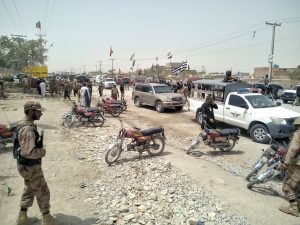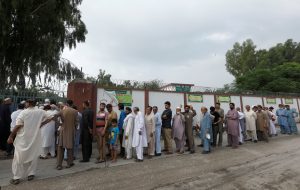
By Brian Ellsworth
CARACAS (Reuters) – Months before Venezuela’s opposition coalition called for abstention in Sunday’s presidential election, college student Ana Romano had already decided not to vote.
While volunteering as a witness in October’s election for state governors, Romano said, she lost count of the number of times activists for the ruling Socialist Party walked into voting booths on the pretext of “assisting” voters – a tactic the opposition says is illegal intimidation.
Romano said pro-government workers at the voting center in the rural state of Portuguesa also refused to close its doors at 6:00 p.m. as per regulations, keeping it open for an extra hour while Socialist Party cadres rounded up votes.
Her experience illustrates why some in Venezuela’s opposition say they will boycott Sunday’s presidential vote despite anger at the South American nation’s unraveling under unpopular President Nicolas Maduro.
“It was four of them against me and I was 20 years old: I couldn’t do anything,” Romano said, adding that she did not file an official report because the other poll center workers would not have signed it – and because there was no paper available to do so.
“I don’t want to have anything to do with this upcoming election,” Romano said. “We’ve already made that mistake.”
Reuters could not independently verify details of her account. Venezuela’s National Electoral Council – the government body in charge of organizing elections – did not respond to phone calls seeking comment.
Venezuela, a once-wealthy OPEC nation, is suffering hyperinflation and widespread food shortages as its economy collapses, leading hundreds of thousands to flee into neighboring countries.
Yet, despite popularity ratings languishing around 20 percent, Maduro is expected to secure a second, six-year term in his deeply divided country, in part due to low opposition turnout.
Some opposition members say participation would be pointless in the face of efforts to tilt the playing field in favor of Maduro, a former union leader who was elected in 2013 after the death of his mentor, late socialist leader Hugo Chavez.
They cite tactics ranging from the kind of small-scale election-center tricks described by Romano to the detention of the most prominent opposition leader Leopoldo Lopez, the coercion of government workers to vote for Maduro and the heavy use of state resources in his campaign.
Many in the opposition say there are inadequate guarantees of a free and fair vote: they point to a ban on Western election observers. The government says they would violate its national sovereignty.
The Venezuelan Electoral Observatory, an independent local election monitoring group, has also flagged problems that include an inadequate timeframe to update the electoral register and develop a network of poll center witnesses, and a reduction in real-time audits of results.
Washington, which has imposed sanctions on Maduro’s government, has said it will not recognize the results of Sunday’s vote.
Breaking the opposition boycott is former state governor Henri Falcon. Opposition leaders have attacked Falcon – a former Chavez ally or ‘Chavista’ – as a stooge who is only running to legitimize Maduro’s reelection.
Falcon, an ex-soldier and two-time governor of Lara state, counters that they are ceding power to Maduro without a fight and insists he would win if discontented Venezuelans turned out to vote.
“So now I’m a ‘Chavista’ just because I have common sense, because I take a clear position and because I act responsibly toward my country?” Falcon said when asked recently by reporters about the opposition’s criticism.
Falcon’s camp was not immediately available for comment for this story.
Maduro and allies deny the elections are unfair and insist the fractured opposition was beaten in October because its voters did not participate – an argument supported by statistics showing low turnout in its strongholds.
“We have an advantage, which is the strength of the people. That can’t be called an unfair advantage,” Maduro said last month.
Participation forecasts vary but, in general, pollsters believe turnout for Sunday’s vote will be far lower than the 80 percent in the last presidential elections in 2013, when Maduro narrowly defeated opposition candidate Henrique Capriles, who is banned from running this time.
One survey by respected pollster Datanalisis showed that the number of people who said they were “very likely” to vote – its most accurate indicator of how many people will participate – had fallen close to 30 percent in March.
In the Caracas slum of La Vega, Jose Vasquez, 49, described the election as too unfair to warrant participation.
“It’s like a game in which the referee is a family member of the other team’s captain,” said Vasquez, selling 40 gram (1 oz) bags of coffee and sugar on a small table in the street. “Why would I waste my time?
ELECTORAL OBSTACLE COURSE
During his 14 years as president, Chavez racked up repeated ballot-box victories thanks to his charisma and generous spending of Venezuela’s oil revenues – much of it on popular health and nutrition programs, as well as on his own electoral campaigns.
The opposition has cried fraud in the past without demonstrating evidence of it, including after a 2004 recall referendum that Chavez won.
But October’s vote included one incident that some opposition sympathizers see as a tipping point: election officials manually changed results at several voting centers in Bolivar state to tip the result in favor of the Socialist Party candidate, according to election center witnesses.
The witnesses produced official poll statements from their voting centers showing that the number of votes for the opposition candidate was higher than those reflected in the National Electoral Council figures for those same centers.
The elections council – stacked with Maduro’s supporters – has never clarified the issue and did not answer Reuters questions regarding the incident.
Maduro’s government has never commented.
More commonly, the opposition has complained of obstacles that reduce the likelihood of their supporters voting but are difficult to classify as fraud in a traditional sense – such as last-minute changes to the location of voting centers.
In the central state of Lara, Alfredo Alvarez learned just days before the October vote that the elections council had changed his voting center – along with that of an estimated 700,000 Venezuelans in 200 voting centers in predominantly opposition areas.
Alvarez, a 62-year-old journalist, had to drive around the city of Barquisimeto for several hours because he could not get a clear answer on where he was supposed to vote.
“I had to investigate: I had to go to five different voting centers. Who can vote under those conditions?” asked Alvarez, who said he ultimately cast his ballot in a polling center run by Socialist Party activists that had no opposition witnesses.
“I’ve been voting since 1973, but I’m not voting in this election. Not under these circumstances.”
Election officials said the changes were necessary primarily because of security concerns, given that some of the centers were near the site of violent opposition protests. Those protests had ended nearly three months before.
Electoral Council officials were not immediately available to explain that discrepancy.
(For a graphic on ‘Latin America’s upcoming elections’ click https://tmsnrt.rs/2rAQ4l1)
(Reporting by Brian Ellsworth, additional reporting by Miguel Angel Sulabaran, Maria de los Angeles Ramirez in Puerto Ordaz, and Vivian Sequera in Turmero; Editing by Alexandra Ulmer, Daniel Flynn and Rosalba O’Brien)










